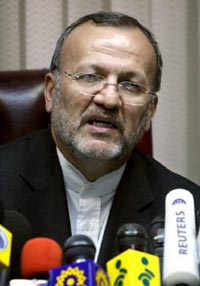Iran foreign minister in Pakistan to boost bilateral cooperation
Iran 's foreign minister and top Pakistani officials discussed increased cooperation on a broad slate of issues Wednesday amid hopes that the neighbors could more than double their trade. Manouchehr Mottaki and top economic advisers to Pakistan 's Prime Minister Shaukat Aziz focused on easing partnerships in banking, customs and agriculture during the first of two days of meetings, Aziz's office said in a statement.

Pakistan said the two countries had the potential to increase annual bilateral trade from US$400 million to US$1 billion. Mottaki, who is also due to meet President Gen. Pervez Musharraf during his visit, said Iran was ready to provide electricity to the Pakistani port town of Gwadar , open a bank branch in Karachi and offer more loans to Pakistani businessmen.
Iran's first vice president, Parviz Dayoudi, is also expected in Pakistan on Thursday for talks that will include Tehran's dispute with Washington over Iran's nuclear program, a Pakistani Foreign Ministry official said. "Definitely, the nuclear issue will also be discussed," said the official, who spoke on condition of anonymity because he was not authorized to speak to media. Pakistan is a key ally of the United States in its war on terror, but it has opposed any use of force against Iran over its nuclear program, and has called for resolving the issue through peaceful means. On Tuesday, Pakistan and neighboring India vowed to build a multibillion dollar pipeline to import natural gas from Tehran to meet their energy needs even as they failed to reach an accord with Iran on a gas pricing formula.
The United States opposes the US$7 billion (5.45 billion) gas pipeline because of its differences with Tehran over its nuclear program, which it alleges is for building a weapon although Tehran says it's only for power generation. U.S. officials have urged Pakistan and India to give up the pipeline and seek other sources to satisfy their burgeoning energy demands. Pakistan and Iran have long-standing ties, but relations were rocked in late 2003 when Tehran told the International Atomic Energy Agency that it had received nuclear know-how from Pakistan the world's only known Islamic nuclear power. Iran 's admission forced Islamabad to arrest about a dozen scientists, including Abdul Qadeer Khan, the father of Pakistan 's nuclear program and a revered figure among many Pakistanis. Khan was later fired, and officials say he is now confined to his Islamabad home amid tight security, reports the AP.
N.U.
Subscribe to Pravda.Ru Telegram channel, Facebook, RSS!


